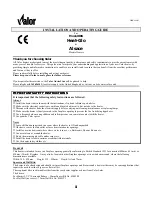
31
BULLETIN 21
DISCOLORED WATER
SYMPTOMS
Rusty, brown, black, or yellow water appearing in the hot water.
CAUSES
Complaints of discolored water are commonly blamed on water heaters and storage
tanks, but in fact, it is a rare occurrence for today’s high quality glass lined tanks to
have a lining failure signi
fi
cant enough to allow water to contact enough bare metal to
discolor the contents of even a small tank.
The most common cause of “rusty” water is a non-toxic iron reducing bacteria,
scienti
fi
cally termed Crenothrix, Leptothrix, and Gallionella. Iron bacteria is commonly
found in soil, water wells, water treatment plants and water distribution piping systems
where soluble iron exceeds 0.2 ppm, higher levels make conditions even more
favorable. Soluble iron in the water provides food for the bacteria. Rusty discolored
water is the end result of the bacteria feeding process. Water heaters and storage
tanks usually require new anode rods as presence of iron bacteria contributes to
premature anode failure.
The requirements for the bacteria to thrive are:
•
Elevated levels of iron and manganese in the water
•
Water with little or no dissolved oxygen
•
Temperatures below 138°F
Items that can increase the potential for this bacteria are:
• Water
softeners
• Well
water
•
Long periods of no water movement
TREATMENT
The simplest treatment available is shock-chlorination of the system. This is a
surface treatment, and often requires repeated trials in heavily infected systems. The
chlorination of a system requires that you follow each step explicitly to avoid an un-
treated portion of the piping system from reinfecting another part. See Bulletin 23 for
the chlorination procedure.
NOTES
Since rusty water is caused by a bacteria presence and is not caused by the
water heater, any treatment would not be considered warranty related.














































